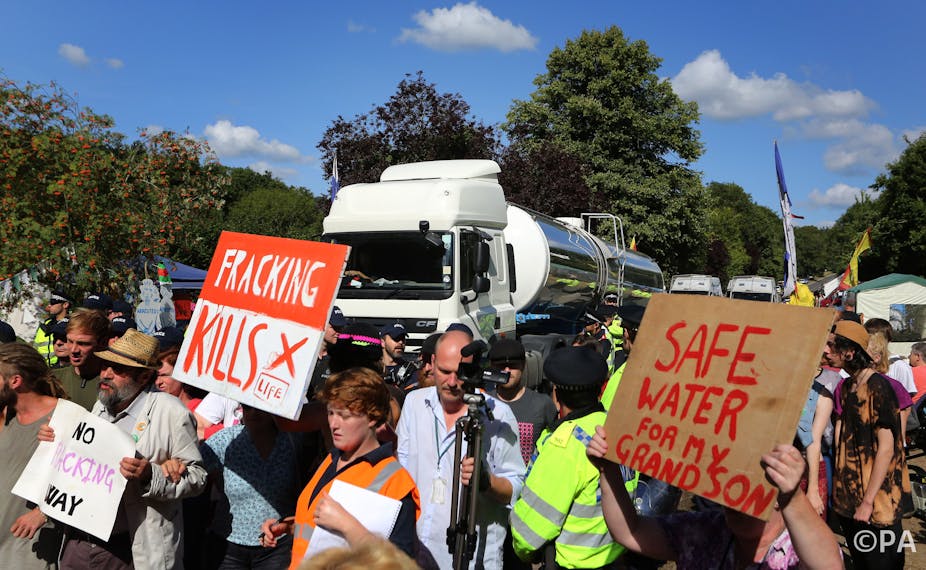While the discovery of what appear to be substantial gas resources under UK soil is an intriguing opportunity for the Department of Energy and Climate Change and the country’s energy companies, lessons from the “fracking boom” in the US give reasons for caution.
First it is questionable whether the “boom” has been or is indeed still a positive development. Second, it is unlikely the US shale experience is even replicable in other countries.
Not what it’s fracked up to be
Despite the hype, many believe the US fracking revolution will be a short-lived phenomenon, may cause environmental problems and might even endanger the economic recovery.
Would-be shale developers in the UK should be cautious of overstated reserves. A substantial gap usually exists between promising estimations of gas reserves and the amount of gas that is commercially viable to recover. There has been little effort to fix this discrepancy – already in 2011 the New York Times reported that “energy executives, industry lawyers, state geologists and market analysts” privately questioned whether companies were “intentionally, and even illegally, overstating the amount” of their resources and the productivity of their wells, a concern the US Energy Information Administration raised only internally at the time.
In 2012 US Energy consultants’ findings further consolidated the strong basis for doubt about the reliability and durability of US shale gas reserves. A team of researchers around Sir David King at Oxford University recently concluded that the oil industry has overstated world shale gas reserves by about a third.
Beyond that, evaluating the success of the fracking boom throws up further problems. Unlike conventional gas drilling, the production rates of fracking wells drop between 60-90% in the first year of use. Overall, the ultimate recovery on a shale gas well is between 8-30%, much lower than the 60-80% for a conventional well. Former Amoco geologist Berman illustrates this point with the example of the Eagle Ford shale field in Texas, where US$10-12 billion would be needed drilling 1,000 wells each year to counteract the decline in productivity.
In 2012 Chesapeake Energy, Exxon Mobil, and BG all had to accept substantial losses, write down or sell shale assets. Currently, 80% of US shale gas production comes from five shale fields, several of which are already in decline and the rest tipped to peak before 2020 – strongly suggesting the industry is in trouble.
Besides economic performance, environmental disturbances such as water contamination, fish kill, land degradation and many more caused by fracking have been confirmed in the US, and scientists predict more.
A one-time-only US experience
If all of the above is not enough to put a damper on UK hopes, there remain irrefutable factors that would prevent fracking from being favourably emulated on our home turf.
A first obstacle arises in that fracking is a lot less socially accepted in this country, as recently exemplified in the Balcombe protests that led to partial closure of one of the sites. From a purely economic perspective, local communities have little to gain from allowing fracking in their area. According to recent case studies fracking has failed to deliver significant job growth, and due to different mineral rights laws private landowners in the UK would not profit from oil and gas beneath their land as they do in the US.
Further obstacles in the way of profitable fracking are the far more strict UK and EU environmental regulations, and less favourable geological conditions in the UK, where shale fields are for example smaller and deeper, that make production more expensive and less profitable. Additionally, companies in the US can take advantage of considerable onshore drilling experience and pre-existing infrastructure that can be easily mobilised to accommodate shale gas. Considering the large investments necessary to access and transport the resource, the British homeowner is unlikely to reap the rewards of cheaper gas in the foreseeable future.
Questions remain
Whether the potential revenue from fracking and the role it may play in diversifying the UK’s energy mix make drilling a profitable endeavour is unclear, and requires careful consideration. But whether or not said revenue is worth potentially grave environmental damage is an equally important consideration that should be open to more public and expert debate before any decisions are made.
Independent research into the economic impact of fracking operations in the UK, considering all costs and benefits and who would carry or reap these, would be highly beneficial. For instance, not only the size of gas reserves must be properly assessed but the cost of new infrastructure, extracting and transporting the gas from underground to the home must be accounted for. Currently it is very unclear who will actually profit from fracking in the UK, and if the public will benefit.
More should be done to lessen the environmental impact of the technique. Several recent publications strongly suggest that fracking could be carried out more safely, but that it simply was not. This option should be thoroughly researched.
Lastly, and most importantly, under no circumstances should fracking supplant support for renewable energies – because no matter how optimistic the resource estimations, there is no doubt that shale gas is as unsustainable as any other fossil fuel, and will be depleted as a usable energy source within the next decades.

